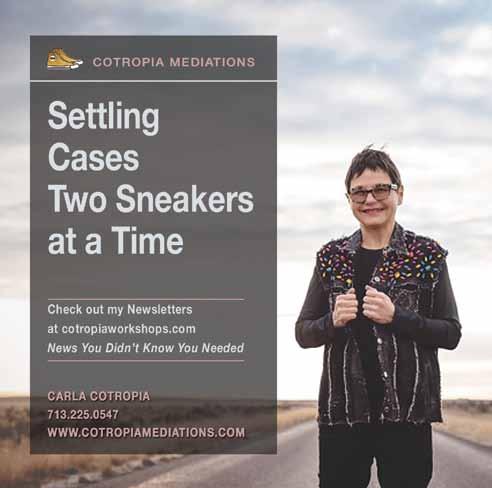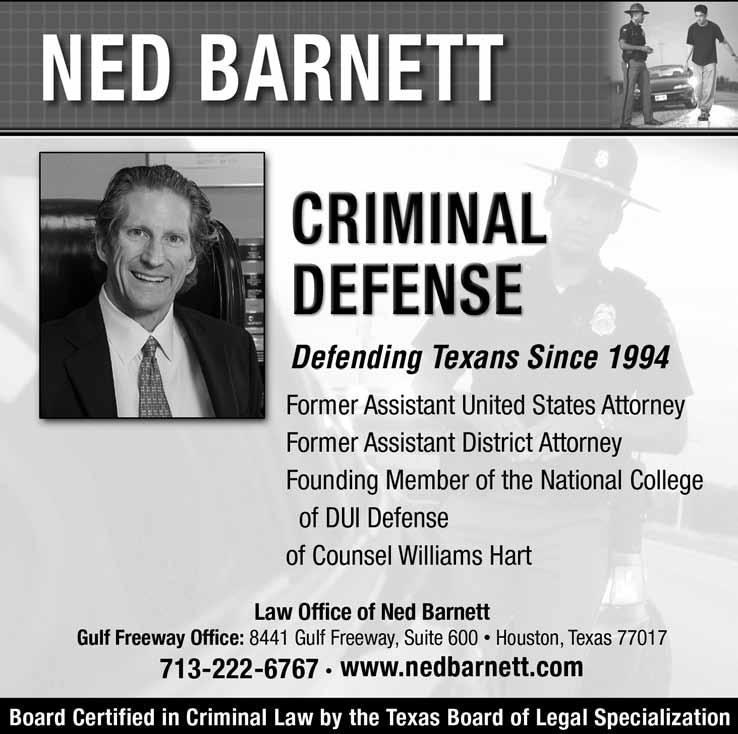
3 minute read
PresidenT’s messaGe
from THL_JanFeb21
by QuantumSUR
By Bill Kroger
Baker Botts l.l.P.
Advice to a Young Lawyer
Winter storm Uri rolled across Texas this February. Temperatures dropped to levels not seen in recent lifetimes. Millions were without heat, electricity and clean water for days. People died. Pipes broke, and rooms flooded. It was another singular disaster during a time full of them.
We live on a crowded planet, with many geopolitical, economic, demographic, technological and other risks. John Maynard Keynes observed many years ago the “intensely unusual, unstable, unreliable, temporary nature” of the modern world. This is especially true now. One event collides into the next, making each impact greater and harder to predict.
Given all of this, I would like to share what I have learned this year that might be of value to a young lawyer facing similar uncertainty. 1. Practice your craft seriously, every day. Good lawyering has never been more important. Work on your writing, speaking and advocacy. It will take at least a decade before you will consider yourself skilled. Be patient. 2. Houston is a wonderful place to practice law. It is youthful, with strong legal and business communities, a diverse, skilled citizenry, great universities and colleges, a vibrant art scene, one of the best medical centers in the world, a large port, low tax rates, and a central geographic location in a dynamic state. 3. Find the right life partner. Your most important life decision will be your choice of spouse or partner, a steadfast rock when winds are blowing. Lawyers who have a steady, loving, supportive partner will be more resilient and capable of handling the pressures, longhours, and ups and downs of practicing law. It is a team sport. Find your lifetime mate. 4. Make smart financial decisions. Pay off all of your debts as soon as possible, including your mortgage and student loans, and build a fortress balance sheet.
You will enjoy the practice of law much more if you are financially strong and independent. 5. Stay healthy and fit, and eat right. Practicing law is a marathon. You will only be able to handle the stresses if you exercise regularly and eat healthily. During the past year, Elizabeth and I ate more healthy foods and worked out regularly with a trainer. Today, I am 15 pounds lighter than when I started this bar year. 6. Be a lifetime reader. Over the long run, your development as a lawyer will depend on the people you meet, the places you visit, and the books and newspapers you read. Lifetime readers become lifetime leaders. I read from a stack of books, four papers and many journals daily. As the range of challenges grow, lawyers need to be conversant across a broad range of topics beyond the law, including environmental and social sciences, local and world histories, economics, accounting and finance, technology, and engineering principles. 7. Be grounded in your community. Most great lawyers are from a place, and are leaders within that same community. It matters less what you do, and more that there are causes and projects in your city that you care about. You will meet people who are not lawyers and engage in problem solving outside of your legal practice. You will be a better person, and that will make you a better lawyer. 8. Support the arts. The liberal and performing arts have never been more important for building a foundation for your understanding of our world. When
COVID-19 hit, I read Tolstoy. No one wrote more accurately about how people think and behave in hard times than Tolstoy. With George Floyd, I recited Walt
Whitman, Langston Hughes, and Gwendolyn Brooks out loud on my front porch. During the winter storm,
I read Melville. And during the entire year, I listened to Beethoven – especially the late quartets and sonatas. The Menil also became a place of reflection. 9. Be open to new ideas and experiences. Be curious.
Stay in the middle, where most solutions lie. Don’t write angry messages. Spend time with people, not devices. Be hopeful and optimistic – most things work out. Most of your biggest worries today will never happen tomorrow. 10.Slow down. When the world speeds, up, go at a calm, steady pace. Keep lists. Sleep. Go for walks. Take breaks when you write so that you have time to reflect.
If you work hard, take your professionalism seriously, and do your best work every day, then over time, you will build a meaningful practice and a rewarding purposeful life, especially in a world with many challenges.










